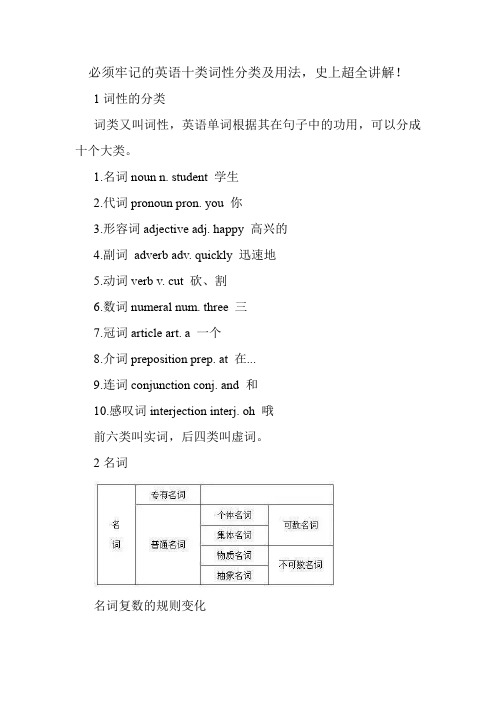英语中各类词的用法
英语形容词副词用法总结

英语形容词副词用法总结英语中的形容词和副词是两种重要的词性,它们在句子中起着描述和修饰的作用。
以下是它们的用法总结:一、形容词的主要用法:形容词修饰名词,说明事物或人的性质或特征。
例如:a beautiful girl(一个漂亮的女孩)。
形容词可以作表语,说明主语的状态、性质等。
例如:The sun is bright today.(今天的阳光很明媚。
)形容词可以作定语,修饰名词。
例如:a red apple(一个红苹果)。
多个形容词修饰名词时,其顺序为:限定词+数量词+描绘词+大小+形状+颜色+国籍+材料+名词。
例如:a small round table(一张小圆桌)。
二、副词的主要用法:副词修饰动词,说明动作的方式、程度等。
例如:He speaks loudly.(他说话很大声。
)副词可以修饰形容词或其他副词,说明它们的程度。
例如:This problem is extremely difficult.(这个问题非常困难。
)副词可以作表语,说明主语的状态。
例如:The light is on.(灯开着。
)副词可以分为时间副词、地点副词、方式副词等。
例如:He often goes to the park.(他经常去公园。
)在这个句子中,“often”是时间副词。
多个副词修饰动词时,其顺序通常为:方式副词+地点副词+时间副词。
例如:He quietly entered the room yesterday.(他昨天悄悄地进入了房间。
)请注意,形容词和副词在句子中的具体用法可能会因语境而异。
为了更准确地使用它们,建议多阅读英语文章和例句,以增强语感。
英语之中名词、代词、动词、形容词、冠词、数词、副词、介词、连词、感叹词

(一)之袁州冬雪创作1、名词名词 (Nouns)是词性的一种,也是实词的一种,是指待人、物、事、时、地、情感、概念等实体或抽象事物的词. 名词可以独立成句.在短语或句子中通常可以用代词来替代.2、代词是代替名词的一种词类.大多数代词具有名词和形容词的功能.英语中的代词,按其意义、特征及在句中的作用分为:人称代词、物主代词、指示代词、自身代词、相互代词、疑问代词、关系代词和不定代词八种.3、动词,就是用来形容或暗示各类动作的词汇.基本上每一个完整的子句都有一个动词,要暗示第二个动作时可以使用不定词、动名词、对等毗连词、从属毗连词或增加子句等方法保持.根据其在句中的功能,动词可分为四类.4、形容词形容词【adjective】很多语言中均有的主要词类中的一种.主要用来修饰名词的词,暗示事物的特征5、冠词的定义冠词是置于名词之前,对名词起限制作用的一种虚词.冠词可以说是名词的一种标记,它不克不及分开名词而独立存在.冠词的分类冠词分为不定冠词"a,an"、定冠词"the"和零冠词三种6、数词暗示"多少"和"第几"的词,叫数词.其用法相当于名词或者形容词.数词分为基数词和序数词两种.暗示数目多少或顺序多少的词叫数词,数词分为基数词和序数词.7、副词(Adverb)副词的定义: 副词是一种用来修饰动词,形容词,副词或全句的词,说明时间,地点,程度,方式等概念.8、介词的定义和特征介词是一种用来暗示词与词, 词与句之间的关系的词.在句中不克不及单独作句字成分.介词后面一般有名词代词或相当于名词的其他词类,短语或从句作它的宾语.(二)1、名词,人或事物的称号3、代词,代替名词或者数词(比方some就是代替数目)3、动词,动作或状态4、数词,暗示数目或顺序(比方序数词,5th就是暗示顺序)5、形容词,人或事物的性质或状态(因为形容词一般修饰名词)6、副词,动作的特征或性状特征(因为副词一般修饰动词或形容词)7、冠词,暗示名词的泛指或特指8、介词,暗示名词或代词与其他词的关系(因为介词后面一半紧跟名词,代词或其他名词性布局)9、连词,毗连词与词,短语与短语,句子与句子10、感叹词,暗示说话时的感情或语气(三)1、adj. / a. 形容词用来描绘一类物质的性质,状态,外貌,或人的性格特点,性质,品格如:big,happy2、adv. / ad. 副词用来修饰动作或形容词,一般在句子中做状语用暗示动作的停止怎样,或暗示程度,特点,如:clearly,happily3、prep. 介词毗连地点,时间的一类词语,可以暗示方位,时间.跟一些暗示时间,地点的词连用暗示介词词组如:in,to,on,under4、conj. 连词用来毗连时间,地点,原因,成果的一类词语如:when,beacuse,so5、num. 数词暗示数字的词,既可以是基数词,也可以是序数词如:one,two,first6、int. 感叹词暗示感叹的一类词,一般不加一诠释,只代表感叹如:what,how,haurray7、vt. 及物动词(后面要加宾语)行为动作的词如:do,finish,play8、vi. 不及物动词(后面不加宾语)暗示行为动作的词如:appear9、n. 名词暗示物体,物质的词如:pig,cow,man10、pron. 代词代指一类人,事或物的词如:he,she,hers,his,things11、art = 冠词,article的缩写(四)在英语语法中主要把词分为8大类:1.名词:暗示人、物或地方等,如:John,teacher;table,pen;London;beauty.2.代词:用来代替名词,以防止重复某个名词,如:I,you,it,that,those,them.3.形容词:用来修饰或限制某个(些)名词,如:good(man),white(paper),every(book),much(water),(John is)hon-est,(He seems)lazy.被修饰或限制的名词,叫做主体词(head-word).4.动词:暗示行为或状态,如:speak,read,go,think,is,seem.5.介词:暗示它后面的名词(或代词)跟它前面的动词、另外一名词或形容词的关系.这些名词(或代词)称为介词的宾语.介词宾语和介词构成介词短语.He went to school.(介词to把名词school和动词went接洽起来)He stood by me.He asked for it.The book on the desk is mine.(介词on把名词book和另外一名词desk接洽起来)He lives in a house on the mountain.他住在山上的一幢房子里.The bridge across this river is built by a Frenchman.河上的桥是一位法国人修建的.He is sure of it.他对此很有掌控.(of接洽it和sure.)It is good for you.这对你有好处.He is angry with Mary.他生玛丽的气.6.副词:修饰或限制动词、形容词或其他副词,甚至介词、连词及整个句子.He walked slowly.他走得很慢.He did it carefully.他干得很仔细.He is a very kind man.他是一个非常善良的人.John is truly honest.约翰的确很诚实.He arrived too late.他到得太晚了.He walked rather slowly.他走得相当慢.He sat far behind me.他坐在我后面挺远的地方.He arrived exactly at seven.他在7点整到达.He will come probably after we take lunch.他能够在我们吃午饭之后到达.He loves her just because she is pretty.他爱她只是因为她漂亮.Luckily,he got back his money.幸好他把钱要回来了. Historically,China is a great nation.从汗青上看中国是个伟大的国家.7.连词:用来毗连词、词组(短语)或句子,如:and,but,or,so;或把一个句子和一动词或名词接洽起来,如:when,because,as,though,that.(连词and把Hong Kong He visited Hong Kong and Singapore.和Singapore毗连起来)他访问了香港和新加坡.She is pretty but cruel.她很漂亮却很残暴.He does exercise in class or at home.他在讲堂上或是在家里做操练.(or把in class和at home两个短语毗连起来)She sat by me,reading novels but turning her eyes tochildren about her from time to time.她坐在我身旁看小说,但不时把眼睛转向她周围的孩子们.He works hard,so he will succeed.他很尽力,所以他会成功.(so把he works hard和he will succeed毗连起来)He says this and that,but he does not mean them.他说这说那,但这些都不是他的真心话.He was writing when it was rainning.下雨时他正在写作.(when把动词was raining和he was writing毗连起来)He became a beggar because he had been a gambler.他成了乞丐因为他爱赌博.He went to school though he was sick.他虽病了,但他仍然上学.The news that the enemy had surrendered soon reached us.不久传来了敌人投降的消息.8.感叹词:用来暗示说话时的感情,如Oh!,Alas!,My!上面只是对8大词类粗略的诠释.别的冠词、数词也可算作两个词类,冠词只有a,an,the3个字,数词可归入形容词中.。
英语词性的分类及用法28p

英语词性的分类及用法一、词性的分类词类又叫词性,英语单词根据其在句子中的功用,可以分成十个大类。
1 名词 nounn. student 学生2 代词 pronoun pron. you 你3 形容词 adjective adj. happy 高兴的4 副词 adverb adv. quickly 迅速地5 动词 verb v. cut 砍、割6 数词 numeral num. three 三7 冠词 article art. a 一个8 介词 preposition prep. at 在...9 连词 conjunction conj. and 和10 感叹词 interjection interj. oh 哦前六类叫实词,后四类叫虚词。
二、名词名词概论专有名词个体名词集体名词可数名词物质名词名词普通名词抽象名词不可数名词名词复数的规则变化情况构成方法例词一般情况加 -smap-mapsbag-bagscar-cars以s, sh, ch, x等结尾的词加 -esbus-buseswatch-watchesce, se, ze,(d)ge等结尾的词加-s license-licenses以辅音字母+y 结尾的词变y 为i再加esbaby---babies其它名词复数的规则变化1) 以y结尾的专有名词,或元音字母+y 结尾的名词变复数时,直接加s变复数:如:two Marys the Henrys monkey---monkeys holiday---holidays2) 以o 结尾的名词,变复数时:a. 加s,如:photo---photos piano---pianos radio---radios zoo---zoos;b. 加es,如:potato—potatoes tomato—tomatoes3) 以f或fe 结尾的名词变复数时:a. 加s,如:belief---beliefs roof---roofssafe---safes gulf---gulfs;b. 去f, fe 加-ves,如:half---halvesknife---knives leaf---leaves wolf---wolves wife---wives life---lives thief---thieves;名词复数的不规则变化1)child---children foot---feet tooth---teeth mouse---mice man---men woman---women2)单复同形如:deer,sheep,fish,Chinese,Japanese3)集体名词,以单数形式出现,但实为复数。
必须牢记的英语十类词性分类及用法,史上超全讲解!

必须牢记的英语十类词性分类及用法,史上超全讲解!1词性的分类词类又叫词性,英语单词根据其在句子中的功用,可以分成十个大类。
1.名词noun n. student 学生2.代词pronoun pron. you 你3.形容词adjective adj. happy 高兴的4.副词adverb adv. quickly 迅速地5.动词verb v. cut 砍、割6.数词numeral num. three 三7.冠词article art. a 一个8.介词preposition prep. at 在...9.连词conjunction conj. and 和10.感叹词interjection interj. oh 哦前六类叫实词,后四类叫虚词。
2名词名词复数的规则变化名词的格在英语中有些名词可以加“‘s”来表示所有关系,带这种词尾的名词形式称为该名词的所有格,如:a teacher’s book。
名词所有格的规则如下:1)单数名词词尾加“‘s”,复数名词词尾没有s,也要加“‘s”,如the boy‘s bag 男孩的书包,men’s room 男厕所。
2)若名词已有复数词尾-s ,只加“‘”,如:the workers’struggle 工人的斗争。
3代词大多数代词具有名词和形容词的功能。
英语中的代词,按其意义、特征及在句中的作用分为:人称代词、物主代词、指示代词、反身代词、相互代词、疑问代词、关系代词、连接代词和不定代词九种人称代词的用法:I saw her with them,at least,I thought it was her.我看到她和他们在一起,至少我认为是她。
(her做宾语,them做介词宾语,her作主补)a. -- Who broke the vase?--谁打碎了花瓶?b. -- Me.--我。
并列人称代词的排列顺序1) 单数人称代词并列作主语时,其顺序为:第二人称you第三人称he/she;it第一人称I如:You, he and I should return on time.2) 复数人称代词作主语时,其顺序为:第一人称we第二人称you第三人称they反身代词指示代词指示代词分单数(this / that)和复数(these / those)两种形式,既可作限定词又可做代词。
英语词性的分类及用法

英语词性的分类及用法'英语词性的分类及用法一、词性的分类词类又叫词性,英语单词根据其在句子中的功用,可以分成十个大类。
1 名词 noun n. student 学生2 代词 pronoun pron. you 你3 形容词 adjective adj. happy 高兴的4 副词 adverb adv. quickly 迅速地5 动词 verb v. cut 砍、割6 数词 numeral num. three 三7 冠词 article art. a 一个8 介词 preposition prep. at 在...,9 连词 conjunction conj. and 和10 感叹词 interjection interj. oh 哦前六类叫实词,后四类叫虚词。
二、名词名词概论名词复数的规则变化名词的格在英语中有些名词可以加"'s"来表示所有关系,带这种词尾的名词形式称为该名词的所有格,如:a teacher's book。
名词所有格的规则如下:1)单数名词词尾加"'s",复数名词词尾没有s,也要加"'s",如the boy's bag 男孩的书包,men's room 男厕所。
2)若名词已有复数词尾-s ,只加"'",如:the workers' struggle工人的斗争。
3)凡不能加"'s"的名词,都可以用"名词+of +名词"的结构来表示所有关系,如:the title of the song 歌的名字。
]4)在表示店铺或教堂的名字或某人的家时,名词所有格的后面常常不出现它所修饰的名词,如:the barber's 理发店。
5)如果两个名词并列,并且分别有's,则表示"分别有";只有一个's,则表示'共有'。
英语十大词性分类及用法附加练习

名词复数的规则变化
情况 一般情况
构成方法 加 -s
例词 maps bags cars
以s, sh, ch, x,z 加 -es 等结尾的词
buses,dishes,watches, boxes,buzzes
以y结尾的专 加 -s 有名词,或 元音字母+y 结尾的名词
反身代词的用法
1. 用作同位语(加强被修饰词的语气,紧放在被修饰名词后, 或句末): The box itself is not so heavy. You said it yourself. 2. 用作宾语(动词或介词的宾语): Take good care of yourself. 3. 用作表语 The poor boy was myself.
英语词性的分类及用法
词性的分类
词类又叫词性,英语单词根据其在句子中的功用,可以分十个大类。
词类
名词 代词 数词 形容词 副词 冠词 动词 介词
连词 感叹词
英语名称
作用
Noun(缩写为n.) 表示人或事物的名称
Pronoun (pron.) 用来代替名词、形容词或数词 等
Numeral (num.) 表示数量或顺序
代词
代词是代替名词的一种词类。大多数代词具有名词和形容词的功能。 英语中的代词,按其意义、特征及在句中的作用分为:人称代词、物 主代词、指示代词、反身代词、相互代词、疑问代词、关系代词和不 定代词八种。
请用n. pron.标注出下列单词的词性
grandpa it
she skirt
teacher he pen kite this book we that brother you school I chair sun
英语中形容词和副词的用法
英语中形容词和副词的用法一、形容词形容词主要用来说明或修饰名词或代词,增加或补充其含义,从而限制或缩小其适用的范围。
表示人或事物的性质、状态和特征。
形容词可在句中充当定语修饰名词、代词,也可作表语表示主语的状态、特征,也可作补语、状语。
作定语:He is a very good swimmer.作表语:He looks very healthy.作宾语补足语:The rain made the ground wet.作主语补足语:She was considered smart.作主语或宾语:The old are respected here and there.The new replaces the old.作状语:Tired and hot, we had to stop to have a break.二、副词副词主要修饰动词、形容词或其他副词,有时也可用来修饰全句。
说明时间、地点、方式、程度等概念。
作状语:It's raining heavily.修饰形容词:It's rather a difficult job.修饰介词短语:The arrow hit the apple right in the middle.修饰从句:This is exactly what she said.修饰名词、代词及数词:Life here is full of joy.She is going to extend her stay there for about two weeks. Nearly everybody came to party.作表语:The class is over.作介词宾语:Who is calling me from downstairs?作定语:Are you content with the life here?作补语:We were shown by the young man.。
英语词性的分类和用法详细讲解
maths,politics,physics等学科名词,为不可数名 词,是单数.news 是不可数名词.
找规律
要点考点聚焦
NOUN.
flower
flowers
watches
factory-factories
boxes
leaf -- leaves
找规律
NOUN. 要点考点聚焦
通常,形容词性物主代词相当形容词的用法,应该位 于名词的前面;名词性物主代词相当于形容词性 物主代词+名词,之后不接名词.
Eg. I like his car.
Our school is here and theirs is there.
This is your picture. And that is mine.
2单复同形如: deer,sheep,fish,Chinese,Japanese 3集体名词,以单数形式出现,但实为复数.
名词复数的不规则变化
如: people police cattle 等本身就是复数,不能 说 a people,a police,a cattle,但可以说a person,a policeman,a head of cattle, the English,the British,the French,the Chinese,the Japanese,the Swiss 等名词,表示 国民总称时,作复数用.
其它名词复数的规则变化
1> 以y结尾的专有名词,或元音字母+y 结尾的名词变复数时,直 接 加s变复数: 如:two Marys the Henrys monkey---monkeys holiday---
holidays 2> 以o 结尾的名词,变复数时: a. 加s,如: photo---photos piano---pianos radio---radios zoo--zoos; b. 加es,如:potato—potatoes tomato—tomatoes 3> 以f或fe 结尾的名词变复数时: a. 加s,如: belief---beliefs roof---roofs safe---safes gulf---gulfs; b. 去f, fe 加-ves,如:half---halves
初中英语的十大词性分类及其用法
初中英语的十大词性分类及其用法英语语法最基础的就是词性了!因为后续的各种时态变化、从句很多的考点都是结合词性才产生的!要想学好语法,那就一定要打牢词性这个基础!一、词性的分类词类又叫词性,英语单词根据其在句子中的功用,可以分成十个大类。
1.名词noun n. student 学生2.代词pronoun pron. you 你3.形容词adjective adj. happy 高兴的4.副词adverb adv. quickly 迅速地5.动词verb v. cut 砍、割6.数词numeral num. three 三7.冠词article art. a 一个8.介词preposition prep. at 在...9.连词conjunction conj. and 和10.感叹词interjection interj. oh 哦前六类叫实词,后四类叫虚词。
二、名词名词复数的规则变化名词的所有格在英语中有些名词可以加“‘s”来表示所有关系,带这种词尾的名词形式称为该名词的所有格,如:a teacher’s book。
名词所有格的规则如下:1)单数名词词尾加“'s”,复数名词词尾没有s,也要加“'s”,如the boy‘s bag 男孩的书包,men’s room 男厕所。
2)若名词已有复数词尾-s ,只加“'”,如:the workers’ struggle工人的斗争。
三、代词大多数代词具有名词和形容词的功能。
英语中的代词,按其意义、特征及在句中的作用分为:人称代词、物主代词、指示代词、反身代词、相互代词、疑问代词、关系代词、连接代词和不定代词九种人称代词的用法:I saw her with them,at least,I thought it was her.我看到她和他们在一起,至少我认为是她。
(her做宾语,them做介词宾语,her作主补)a. -- Who broke the vase?--谁打碎了花瓶?b. -- Me.--我。
初中英语英语十类词性分类及用法,史上最全讲解!
英语十类词性分类及用法,史上最全讲解!一、词性的分类词类又叫词性,英语单词根据其在句子中的功用,可以分成十个大类。
1.名词 noun n. student 学生2.代词 pronoun pron. you 你3.形容词 adjective adj. happy 高兴的4.副词adverb adv. quickly 迅速地5.动词 verb v. cut 砍、割6.数词 numeral num. thr ee 三7.冠词 article art. a 一个8.介词 preposition pr ep. at 在...9.连词 conjunction conj. and 和10.感叹词 interjection interj. oh 哦前六类叫实词,后四类叫虚词。
二、名词名词复数的规则变化名词的格在英语中有些名词可以加“‘s”来表示所有关系,带这种词尾的名词形式称为该名词的所有格,如: a teacher’s book。
名词所有格的规则如下:1)单数名词词尾加“'s”,复数名词词尾没有s,也要加“'s”,如the boy‘s bag 男孩的书包,men’s room 男厕所。
2)若名词已有复数词尾-s ,只加“'”,如:the workers’ struggle工人的斗争。
三、代词大多数代词具有名词和形容词的功能。
英语中的代词,按其意义、特征及在句中的作用分为:人称代词、物主代词、指示代词、反身代词、相互代词、疑问代词、关系代词、连接代词和不定代词九种人称代词的用法:I saw her with them, at least, I thought it was her.我看到她和他们在一起,至少我认为是她。
(her做宾语,them做介词宾语,her作主补)a. -- Who broke the vase?--谁打碎了花瓶?b. -- Me.--我。
并列人称代词的排列顺序1) 单数人称代词并列作主语时,其顺序为:第二人称第三人称第一人称You He/she,it I如:You, he and I should return on time.2) 复数人称代词作主语时,其顺序为:第一人称第二人称第三人称We you they反身代词指示代词指示代词分单数(this / that)和复数(these / those)两种形式,既可作限定词又可做代词,疑问代词指人:who,whom,whose指物:what既可指人又可指物:which四、冠词冠词是位于名词或名词词组之前或之后,在句子里主要是对名词起限定作用的词。
- 1、下载文档前请自行甄别文档内容的完整性,平台不提供额外的编辑、内容补充、找答案等附加服务。
- 2、"仅部分预览"的文档,不可在线预览部分如存在完整性等问题,可反馈申请退款(可完整预览的文档不适用该条件!)。
- 3、如文档侵犯您的权益,请联系客服反馈,我们会尽快为您处理(人工客服工作时间:9:00-18:30)。
英语中各种词的用法介词是一种用来表示词与词, 词与句之间的关系的词。
在句中不能单独作句字成分。
介词后面一般有名词代词或相当于名词的其他词类,短语或从句作它的宾语。
介词和它的宾语构成介词词组,在句中作主语, 状语,表语,补语或介词宾语。
例如:Most of the students went to the classroom.大部分学生去了教室。
We play basketball on the sports ground.我们在操场上打蓝球。
介词常与动词,形容词,名词一起构成固定搭配。
belong to 属于rely on 依靠talk to 同...谈话be afraid of 害怕be strict with对...严格介词一般放在名词之前。
但它后面的介词宾语是疑问代词,疑问副词或者关系代词时,这些词提到了前面而只剩下介词在后了。
Where do you come from?你是哪儿人?Who are you talking to?你在跟谁谈话呢?What do you study for?你为了什么而学习?介词在英语词汇中所占比例很小,但它们的用法却非常灵活,复杂。
以下是一个例子:about 关于,附近,大约,周围,随身.I have bought a book about Shakespearean.我买了一本有关莎士比亚的书。
1. WITH(1)v+with(a) v+withbegin, mix, agree, deal, fight, meet, play, quarrel, do, fool, reason,correspond, comply, settle.(b) v + sth (sb) + with + sth (sb)compare, provide, supply, feed, replace, combine, equip, furnish,(2)adj+withangry, strict, pleased, busy, covered, satisfied, filled, wrong, wild, crowded, connected, popular, covered, patient, annoyed, acquainted, delighted, confronted, content, friendly, identical, frank, concerned, bored, afflicted, associated, blended, burdened, comparable, consistent, disappointed, displeased, endowed, enraged, exhausted, familiar, gifted, impatient, infested, intimate, irritated, level, moved, occupied, overcome, popular, satisfied, vexed(3) n+withacquaintance, alliance, trouble, talk, chat, connection, consultation, conversation, sympathy,2. AT(1)v+ataim, point, snatch, wonder, strike, work, look, glance, laugh, run, catch, shoot, stare, glare, thrust, smile, call, fire, tear, knock, winder, arrive, come, gasp(2)adj+atamused, delighted, angry, good, surprised, astonished, pleased, terrified, clever, alarmed, astonished, clumsy, disgusted, impatient, quick, startled, surprised(3)n+atknock, pull, look, glance, smile, game, astonishment, surprise, alarm,3. IN(1)v+inget, lie, turn, draw, believe, share, take, drop, give, call, hand, succeed, bring, result, trade, involve, check, count, cut, indulge, pour, participate, intervene, fill,join, confide, trust, believe,persist, consist,(b) V+sb(sth)+inhelp, spend(2)adj+inrich, interested, active, disappointed, engaged, busy, weak, expert, successful, absorbed, skilled, concerned, experienced, confident, employed, accurate, clothed, diligent, negligent, proficient, prompt, versed,(3)n+ininterest, progress, satisfaction, faith, belief, confidence, response, pride, perseverance, harm, difficulty,pleasure, confidence, delight,4. FROM(1)V+from(a) V + fromlearn, die, come, suffer, hear, fall, rise, hang, escape, date, depart, result, descend, refrain, abstain, differ, distinguish, derive, expel, conceal, judge(b) V + sth ( sb) +from + sth ( sb or a place)borrow, protect, receive, separate, keep, stop, prevent,deter, choose, remove, save, dissuade, excuse, restrain(2)adj+fromdifferent, far, tired, made, separate, absent, distinct, hidden, made, (3)n+fromletter, visitor,absence, difference, protection, relief, rescue,5. OF(1)V+of(a) V+ofconsist, dream, hear, tell, think, know, talk, die, speak(b) V+sb+of+sthrob, warn, inform, remind, accuse, cheat, convince, relieve, deprive, (c) V+sth+of+sbask, beg, demand, require,(2)adj+ofaware, careful, free, short, sure, certain, worthy, afraid, hopeful, proud, full, tired, made, capable, impatient, considerate, characteristic, guilty, capable, composed, jealous, ashamed, envious, ignorant, apprehensive, bare, cautious, clear, composed, conscious, descriptive, exclusive, forgetful, fond, hard, incapable, informed, innocent, made, mindful, neglectful,observant, possessed, productive, regardless, rid, sensible, sick, susceptible, weary(3) n+ofquality, number, sample, choice, impression, neglect, attack, care, consideration, pleasure, doubt, way equivalence, possibility, example,6. ON(1)v+on(a) v+onact, lean, live, work, depend, look, wait, turn, switch, pull, have,keep, call, put, push, speak, insist, push, collaborate, count, frown, reckon, speculate, figure, carry,(b) V+sb(sth)+ON+sb(sth)congratulate, spend, base, fix(2)adj+onhard, keen, dependent, based, impressed,(3)n+onbook, discussion, lecture, advice, opinion, impression, attack, dependence, judgment, pity, mercy, authority7. TO(1)v+to(a) v+tolisten, stick, refer, turn, point, reply, occur, attend, see, lead, happen, come, get, write, hold, agree, belong, adapt, attribute, object, subscribe, adjust, accede, yield, resort, relate, respond, testify, succumb,(b) v+to+sbannounce, describe, explain, express, mention, report, say, shout, suggest, whisper, speak, talk, nod,(c) v+sth(sb)+sth(sb)devote, compare, add, introduce, invite, leave, join, reduce, sentence, carry, take,(2)adj+toequal, opposed, true, familiar, close, near, kind, harmful, polite, rude, similar, useful, married, known, used, good, dedicated, fair, essential, parallel, related, sensible, relevant, possible, indifferent, devoted, comparable, necessary, contrary, suitable, strange, close, alike, opposite, familiar, inferior, superior, proportionate, accessory, accustomed, adapted, addicted, adequate, adjacent, afflicted, akin, alive, amenable, applicable, attentive, awake, blind, common, conductive, congenial, contiguous, contrary, corresponding, deaf, derogatory, disagreeable, displeasing, distasteful, exposed, false, fatal, grateful, hostile, important, indifferent, loyal, moved, obedient, odious, opposite, painful, partial, peculiar, pleasant, precious, preferable, precious, prior, profitable, prone, proper, relative, relevant, sacred, strange, subsequent, susceptible, thankful, troublesome,(3)n+tokey, answer, visitor, end, way, solution, traitor, attention, exception, gratitude, approach8. FOR(1)v+for(a)v+foraccount, beg, hope, send, look, ask, long, pay, wish, wait, leave, fight, plan, prepare, care, stand, search, answer, run, call, bargain, inquire, press, apply, provide, apologize,grieve(b)v+sb+for+sthask, blame, forgive, pardon, pay, praise, punish, reward, thank, excuse, (2)adj+foreager, bad, good, famous, fit, suitable, ready, sorry, grateful, useful, late, responsible,proper, crucial, competent, eligible, noted, renowned, appropriate, notorious, convenient, possible, profitable, liable, necessary,anxious, bound, eligible, impatient, liable, sufficient, uncared, unfit, zealous, (3)n+forplan, need, reason, explanation, ability, affection, excuse, ambition, anxiety, reputation, consideration, necessity, talent, sympathy, cause, pretext, qualification9. ABOUT(1)v+aboutquarrel, agree, consult, complain, speak, bring, think, set, care, fumble, fuss, leave, move, lie, hear,speculate, inquire,(2)adj+abouthappy, anxious, nervous, cautious, careful, certain, excited, particular, pleased, concerned, enthusiastic,uneasy, troubled(3)n+onconcern, anxiety, opinion, question.副词的用法He studies hard. 他用功读书。
